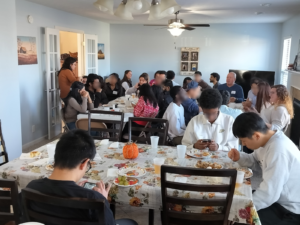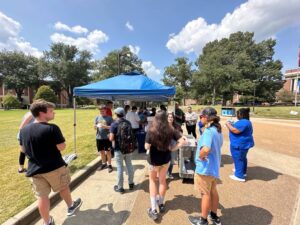7 Tips for Connecting Students to God through Prayer
1. Help students experience intimacy with their heavenly Father.
Students who have had a poor or painful experience with an earthly father often have great difficulty wanting to get close to their heavenly Father. This is huge challenge due to the disintegration of family life and the increased sinfulness of humanity. Pray for spiritual healing, for a breaking of the bondage to memories of the past, and for God the Father to reveal His love in real and personal ways.
2. Teach newer Christians the basics of personal and group prayer.
Students who are young in faith or who have not been around praying people may be hesitant to pray aloud. Give them permission not to pray aloud and don’t pray around the circle in a way that will pressure them. But provide opportunities for them to learn the basics of prayer. Consider using my book, Growing Disciples Series: Pray in Faith (coauthored with T. W. Hunt; also available as an eBook), to teach 6 kinds of prayer and how to pray together. The weekly small group becomes a prayer meeting for students to practice what they learn during their private devotions.
3. Ask: How may I (we) pray for you? Then pray.
Students may be secretly carrying some very heavy burdens related to family, relationships, career decisions, academics, and… Sometimes you will see it in their faces or by observing their emotions. Ask: How may I pray for you? If the pain level is sufficient or a level of trust is present, students may unload that heavy burden with a “mustard seed of faith” that God could help. Pause to pray on the spot. When God answers the prayer, He builds faith to trust Him for greater things. Students experientially learn the skill of personal intercession. Use the same question in small (3-5), same-gender groups and watch to see how God develops the bonds of love in the body of Christ.
4. Equip intercessors and staff a prayer station to offer prayer for felt needs.
In 1992 Youth With A Mission (YWAM) set up Prayer Stations in New York City’s Times Square for their annual New Year’s Eve evangelistic outreach. They faced a crisis of belief: Would sophisticated New Yorkers publicly ask for prayer? They were blown away at the huge response of people asking for prayer. Once intercessors prayed for a person’s felt need, that person was far more open to an evangelistic witness. Now Prayer Stations are a standard operating procedure for many of their outreaches in the city. For ideas on your own prayer outreach take a look at: www.prayerstations.org
5. Move students to pray for significant Kingdom purposes.
Students are yearning for something worth giving their time and life to. Guide students to pray for God’s kingdom agenda on your campus, in your city, in the home countries represented by your international students, and elsewhere around the world. Consider the case of Leonard Dober, Tobias Leupold, and David Nitschmann (in 1732) who prayed for Negro slaves in the West Indies and were willing to sell themselves into slavery to preach the gospel. Gaining permission from the slave owners, Leonard and David took up trades on St. Thomas Island and became the first missionaries of the Moravian Church. As students pray for God’s work, God’s Spirit will stir some and call them to a life-changing assignment.
6. Provide a variety of meaningful prayer experiences.
Provide opportunities for a variety of prayer experiences: prayer in pairs or triplets, small- and large-group prayer, concert of prayer, prayerwalking, prayer vigil, 24-hour prayer, special days of prayer (for example: Collegiate Day of Prayer, National Day of Prayer, or International Day of Prayer for the Persecuted Church), etc.
7. Inspire students toward a praying lifestyle by providing a library and recommending reading of classic books and biographies.
Consider With Christ in the School of Prayer, Disciple’s Prayer Life, The Practice of the Presence of God, The Kneeling Christian, What Happens When Women Pray; and biographies about people like John Hyde, Hudson Taylor, George Muller, David Brainerd, and Rees Howells.
Guest Blogger–Claude V. King (Discipleship and Church Health Specialist, LifeWay Christian Resources)





